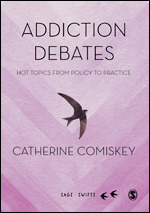Between the Lines: Catherine Comiskey
 When did you first come up with the idea for the book?
When did you first come up with the idea for the book?
I had been thinking about writing Addiction Debates for some time but as I was in the Head of School role I didn’t have the dedicated time. Once my role was completed I made a point of focusing on the book. Also I think I was influenced to write the book for far longer than I had realised. When I was an undergraduate student in Trinity in the 1980s when I crossed O’Connell Bridge I would see young disadvantaged children glue sniffing, then when I did my PhD on mathematical models for the spread of HIV and AIDs I again saw the devastation of addiction in people’s lives.
Did you start out with the intention of writing a book about a particular topic, or did a book begin to make sense as you were researching?
I had thought I would write a book about Addiction Research Methods but there were so many current debates in addiction - from debates on decriminalisation to debates on safe injecting sites - I had to write that book first. I wanted to present the international evidence and bring that to the fore in order to inform the current societal debates. Also I was exposed to the evidence in my role as the Vice Chair of the Scientific Committee of the European Monitoring Centre for Drugs and Drug Addiction and my role as sole academic expert on the National Drug Strategy Implementation Committee.
What are the book's main ideas?
The book explores the international evidence on the current debates in addiction. It starts off by debating the underlying philosophies and theories of addiction, then moves into the debates themselves, and concludes with a policy and service development framework that places clients of addiction services at the centre. The debates cover the topics of
- Towards Treatment and Harm Reduction or Recovery and Rehabilitation
- The Cannabis Conundrum: Prohibition, Criminalisation or Legalisation
- Medically Supervised Safe Injecting Facilities, Drug Consumption Rooms and Local Communities
- Hidden Harms and The Children of Parents Who Use Substances
- Ageing, Chronic Illness and Caring for People Who Use Drugs
- Trade Wars and The Opiate Epidemic
- This House Concludes: The Future of Research, Policy and Practice
What did writing a book allow you to do that wouldn’t have been possible in another medium eg. journal article?
Writing the book gave me greater freedom to express the breadth of issues from a range of angles and from a range of national and international literature.
How did you decide which publisher to place the book with?
I was really fortunate in that the first publisher I approached accepted my proposal with some modifications. I had used some of the SAGE nursing books in my class lists so I simply went on to their website and read up on how to submit a book proposal, and then worked on making it as professional as possible before I submitted it.
How long did it take to write?
Again I was very fortunate but also very focused. I wrote the proposal in November 2018 and had the first draft of the book written by the end of May 2019. It was a very tight turnaround time but I prioritised it over my usual output of academic papers, and I had reduced teaching for the duration. I had managed to get a grant to buy out some of my classes.
Did you ever experience any moments of writer’s block? What did you do to overcome this?
I was under so much pressure I couldn’t afford to have writers block! But having said that I did find one chapter which I thought would be easy - the opiate epidemic chapter - quite difficult. I hadn’t anticipated that. However I set myself goals and rewards. I often wrote on a Friday all day, with a self-imposed deadline for specific output. At the end of the day I would reward myself with a walk on the beach and a beer. I had a carrot and stick approach. If the goal hadn’t been achieved I would write on Saturdays, which was often the case. But then there would be another walk and another beer.
What advice would you give someone thinking about writing a book?
I would say to just go for it. But to achieve it you need to give yourself the space to do it, and you need to prioritise it over other demands. I would also advise that you spend time on the proposal to get it right and to be open to the publisher’s suggestions for change, even if they are major.
Catherine Comiskey
Professor Comiskey has over 20 years research and lecturing experience in statistics and mathematics applied to healthcare and her personal research interests are in substance use, child wellbeing and innovation.
She has served on numerous advisory committees, and from 2017 has been the sole academic expert on the National Drug Strategy Implementation Committee.
- Buy Addiction Debates
- Catherine’s Blog
- Reducing Harm, Supporting Recovery
- Better Data, Better Policy, Better Lives

